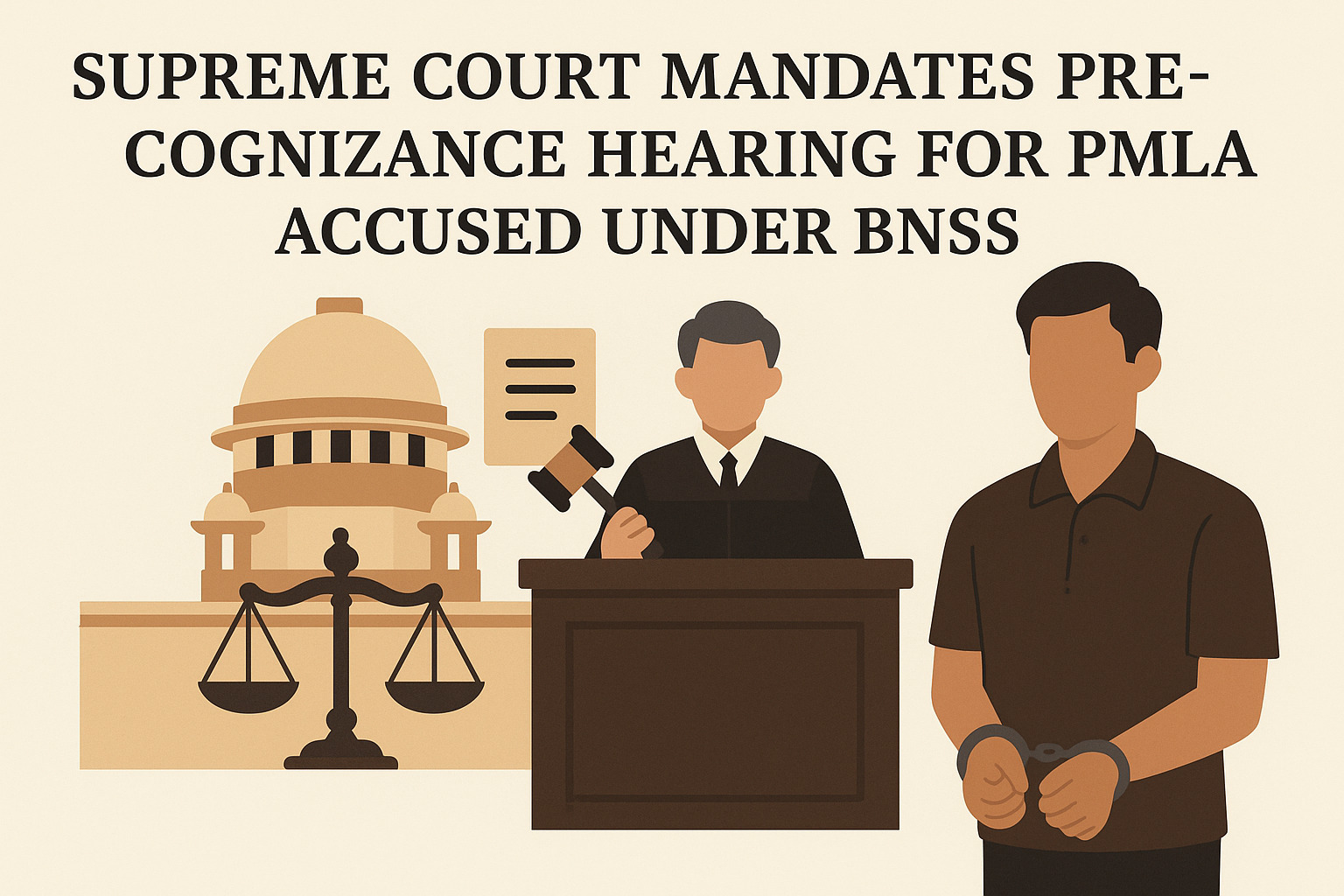View News
Supreme-Court-Mandates-Pre-Cognizance-Hearing-for-PMLA-Accused-Under-BNSS

Supreme Court Mandates Pre-Cognizance Hearing for PMLA Accused Under BNSS
Introduction
In a significant development, the Supreme Court of India has held that individuals accused under the Prevention of Money Laundering Act, 2002 (PMLA), are entitled to a pre-cognizance hearing if the complaint by the Enforcement Directorate (ED) is filed after the Bharatiya Nagarik Suraksha Sanhita, 2023 (BNSS) came into effect on July 1, 2024. This ruling strengthens procedural fairness and reaffirms the constitutional right to be heard.
Background
The Prevention of Money Laundering Act (PMLA) serves as a critical statute in India's efforts to combat financial crimes and money laundering. Under Section 44(1)(b) of the PMLA, the ED is empowered to file complaints directly before designated Special Courts for trial of offences under the Act.
Historically, the procedure for such complaints was governed by the Code of Criminal Procedure, 1973 (CrPC). However, with the BNSS, 2023, now replacing the CrPC, several significant procedural reforms have been introduced. One such key provision is Section 223(1) of the BNSS, which mandates that a Magistrate must afford the accused an opportunity to be heard before taking cognizance of any offence. This marks a paradigm shift toward ensuring early-stage judicial scrutiny and adherence to the principles of natural justice.
Supreme Court's Ruling
The ruling was delivered by a two-judge Bench comprising Justice Abhay S. Oka and Justice Ujjal Bhuyan, which considered the applicability of Section 223(1) of the BNSS in the context of PMLA prosecutions.
Key Observations of the Court:
-
BNSS Is Procedurally Applicable to PMLA Cases: The Court clarified that even though PMLA is a special law, the procedural framework for criminal trials under the PMLA must comply with the BNSS where applicable.
-
Pre-Cognizance Hearing Is Mandatory: For complaints filed after July 1, 2024, the Special Court is bound to follow BNSS provisions, including offering the accused a chance to be heard before cognizance is taken.
-
Alignment with Natural Justice: The ruling upholds the broader objective of criminal justice—ensuring that the accused is not condemned unheard and is given a reasonable opportunity to present a defence from the very beginning.
Implications of the Ruling
This landmark judgment has far-reaching consequences for the legal landscape surrounding money laundering prosecutions in India.
1. Enhanced Procedural Safeguards
The ruling reinforces the right to be heard and ensures that accused individuals are given a voice before judicial proceedings formally begin. This strengthens the fundamental principles of fair trial and natural justice.
2. Clarification on BNSS Applicability
The decision removes ambiguity about the procedural law applicable to PMLA cases. It affirms that the BNSS applies to all complaints filed post-July 1, 2024, ensuring uniformity in criminal procedure.
3. Potential Review of Past Proceedings
Although the ruling is prospective, i.e., limited to complaints filed after the BNSS came into force, it may set the stage for judicial scrutiny of earlier cases where similar procedural safeguards were absent. Litigants might seek retrospective relief by invoking principles of procedural fairness.
Conclusion
The Supreme Court’s decision marks a progressive shift in India's criminal jurisprudence, particularly in relation to special legislation like the PMLA. By mandating a pre-cognizance hearing, the Court has reaffirmed its commitment to upholding the rule of law, natural justice, and procedural fairness.
This judgment aligns seamlessly with the objectives of the BNSS, which seeks to modernize India's criminal justice system and make it more equitable and accountable. It also sends a clear message to investigative agencies and trial courts about the non-negotiable nature of procedural rights in the prosecution of even the most serious offences like money laundering.
Key Takeaway
Accused under the PMLA now have a legally enforceable right to be heard before cognizance is taken by the Special Court—ushering in a new era of procedural fairness under the BNSS regime.
"Unlock the Potential of Legal Expertise with LegalMantra.net - Your Trusted Legal Consultancy Partner”
Disclaimer: Every effort has been made to avoid errors or omissions in this material in spite of this, errors may creep in. Any mistake, error or discrepancy noted may be brought to our notice which shall be taken care of in the next edition In no event the author shall be liable for any direct indirect, special or incidental damage resulting from or arising out of or in connection with the use of this information Many sources have been considered including Newspapers, Journals, Bare Acts, Case Materials , Charted Secretary, Research Papers etc

